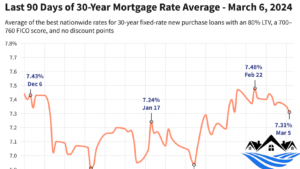Introduction to Mortgage Rates
Mortgage rates play a crucial role in the real estate market, determining the cost of borrowing money to purchase a home. They fluctuate based on various economic factors and can significantly impact homeownership affordability.
Factors Influencing Mortgage Rates
Economic Conditions
Economic indicators such as inflation, unemployment rates, and GDP growth influence mortgage rates. A strong economy generally leads to higher mortgage rates, while a weak economy tends to result in lower rates.
Federal Reserve Policies
The Federal Reserve’s monetary policies, including adjustments to the federal funds rate, directly affect mortgage rates. Changes in the federal funds rate influence the cost of borrowing for banks, which in turn impacts mortgage rates.
Housing Market Trends
Supply and demand dynamics within the housing market also impact mortgage rates. High demand for homes typically leads to higher rates, while a surplus of inventory may result in lower rates.
Recent Trends in Mortgage Rates
Recent data indicates that mortgage rates started slightly higher but finished lower over a specific period. This fluctuation reflects the dynamic nature of the financial markets and the influence of external factors.

Analysis of the Current Situation
Initial Increase Followed by a Decrease
The initial uptick in mortgage rates may have been driven by factors such as positive economic data or speculation about future Federal Reserve actions. However, the subsequent decrease suggests a shift in market sentiment or external pressures exerting downward pressure on rates.
Impact on Borrowers
For prospective homebuyers, the fluctuation in mortgage rates presents both challenges and opportunities. Higher rates can increase borrowing costs, making homeownership less affordable. Conversely, lower rates may incentivize buyers to enter the market, driving demand for homes.
Reasons Behind the Fluctuation
Market Volatility
Uncertainty and volatility in the financial markets can lead to fluctuations in mortgage rates. Investors may react to geopolitical events, economic indicators, or changes in monetary policy, causing rates to rise or fall rapidly.
Global Economic Factors
Global economic conditions, such as trade tensions, currency fluctuations, or central bank actions in other countries, can also impact mortgage rates. Interconnectedness in the global economy means that events abroad can influence domestic interest rates.
Forecast for Future Mortgage Rates
While predicting future mortgage rates with certainty is challenging, analysts closely monitor economic indicators and market trends to provide forecasts. Factors such as inflation expectations, employment figures, and Federal Reserve guidance will likely influence future rate movements.

Strategies for Prospective Homebuyers
Given the uncertainty surrounding mortgage rates, prospective homebuyers should consider several strategies:
- Monitor Market Trends: Stay informed about economic indicators and market developments that could impact mortgage rates.
- Locking in Rates: Consider locking in a mortgage rate when it’s favorable to secure a lower interest rate for the duration of the loan.
- Flexible Financing Options: Explore various loan products and financing options to find the best fit for your financial situation.
- Consult with Experts: Seek guidance from mortgage professionals who can provide personalized advice based on your individual needs and goals.
Impact on Refinancing
Existing homeowners may also be affected by fluctuating mortgage rates, especially those considering refinancing:
- Opportunistic Refinancing: Take advantage of lower rates to refinance existing mortgages and potentially reduce monthly payments or shorten the loan term.
- Evaluate Cost-Benefit: Assess the costs associated with refinancing against potential savings to determine if it’s financially advantageous.
- Timing Considerations: Monitor rate trends and market conditions to identify optimal timing for refinancing.

Mortgage rates
Conclusion
In conclusion, while mortgage rates may start slightly higher before finishing lower over a given period, they are subject to fluctuation due to various economic and market factors. Prospective homebuyers and existing homeowners alike should stay informed, consider their options carefully, and seek professional guidance to navigate the complex landscape of mortgage financing.
Unique FAQs:
- What causes mortgage rates to fluctuate? Mortgage rates fluctuate due to factors such as economic conditions, Federal Reserve policies, and housing market trends.
- How can I benefit from lower mortgage rates? Lower mortgage rates can lead to reduced borrowing costs for homebuyers and may present opportunities for refinancing existing mortgages to save money.
- Should I lock in my mortgage rate? Locking in a mortgage rate can provide certainty and protection against potential rate increases, but it’s essential to consider your individual financial situation and market conditions.
- What is the Federal Reserve’s role in setting mortgage rates? The Federal Reserve’s monetary policies, including adjustments to the federal funds rate, influence short-term interest rates, which in turn affect mortgage rates.
- How can I keep up with changes in mortgage rates? Stay informed by monitoring economic indicators, market developments, and consulting with mortgage professionals who can provide personalized advice.
Read More:>

